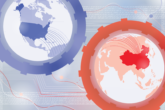June 27, 2022
Building a Silicon Bulwark: How the United States and Taiwan Can Retain Joint Leadership of the Global Semiconductor Industry
In March of this year, the Taiwan Ministry of Justice’s Investigation Bureau (法務部調查局) launched probes into more than 100 companies suspected of trying to woo the island’s semiconductor engineers to work for mainland Chinese companies. Two months later, it raided the offices of 10 more semiconductor companies and summoned their owners for questioning about talent poaching.
China’s efforts to sabotage Taiwan’s chipmaking industry are not new. In 2019, for example, Taiwan’s Business Weekly reported that more than 3,000 semiconductor engineers had already departed the island for positions at mainland companies, amounting to nearly one-tenth of the roughly 30,000 Taiwanese engineers involved in semiconductor research and development (R&D). Although Chinese firms face significant barriers in various segments of the semiconductor industry, they have succeeded in amassing a wealth of intrinsic knowledge by luring not only top Taiwanese executives, but also “entire production teams on the ground.”
Given its prominent position in so many global supply chains, threats to Taiwan’s semiconductor industry are a source of international concern.
Given its prominent position in so many global supply chains, threats to Taiwan’s semiconductor industry are a source of international concern. This article argues that, despite their competing interests in some segments of the chip market, the US and Taiwanese governments share an interest in strengthening mechanisms for mutual legal assistance, harmonizing approaches to export control, and pooling investments in semiconductor fabrication.
Read the full article from The Global Taiwan Institute.
More from CNAS
-
Technology & National Security
Countering the Digital Silk RoadExecutive Summary The year 2025 marks the 10th anniversary of the Digital Silk Road (DSR), China’s effort to strengthen its global ties and influence through technology. In th...
By Vivek Chilukuri & Ruby Scanlon
-
Technology & National Security
Microsoft Announcement Highlights Complicated Relationship Between Big Tech and WarMicrosoft restricted the Israeli military's access to some of its technology after it found that Israel's Defense Ministry was using its services to carry out mass surveillanc...
By Paul Scharre
-
Technology & National Security
Quantum Sensing at Scale: Navigating Commercialization RoadblocksQuantum sensing is racing forward in the lab—but turning prototypes into products still means wrestling with supply chains, certification, and unit economics. In “Quantum Sens...
By Constanza M. Vidal Bustamante
-
Technology & National Security
Constanza Bustamante, Research Fellow at the Center for a New American Security (CNAS) Joins the Superposition Guy’s PodcastConstanza Bustamante, a fellow at the Center for a New American Security (CNAS) is interviewed by Yuval Boger to discuss quantum policy at the nexus of national and economic s...
By Constanza M. Vidal Bustamante




